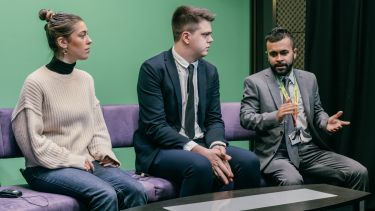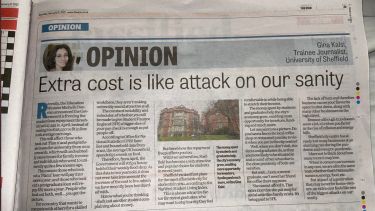Building my confidence and making friends for life

What did you enjoy most about the course?
What I enjoyed most about the course was how collaborative it is across all forms of journalism. As someone who was on the MA Journalism course, I often wondered whether I would get the chance to explore broadcast journalism. I was able to learn some basic skills such as how to take a good photograph, how to use photoshop, ways to take effective video, how to make a podcast and also how video edit. I really thoroughly enjoyed learning how to branch out into all paths of journalism, and I have a wider understanding of how things work due to multiple group projects with both MA Journalism and MA Broadcast Journalism. The broadcasters were able to work on their writing skills, and we were given the opportunity to work on our broadcast skills.
I have made friends for life throughout both courses, and I love how collaborative the Sheffield news days are. Print, radio and television come together as one to work on stories which is a wonderful sight to see. Sheffield has managed to create what you see and experience in a real newsroom.
Did you secure any work experience?
During the course, I freelanced for the Sheffield Star, approximately one day a week, for 6 months, then spent one week at the Independent during the Easter holidays.
The Sheffield Star assisted in building my confidence, which has made me feel at ease in multiple newsrooms. I was once asked to cover the aftermath of a fire in a building in Sheffield for The Star, and although I was nervous because I had not done anything like that before, I took the plunge and did it. The Star always believed me and trusted I could do it, which meant a lot. I was recently asked to cover a fire in London for the Press Association, and because I had covered one before with The Star, it gave me faith and belief that I could do it. Everyone at The Star is extremely friendly and always make time to give you feedback on your work. Some of my essential skills that I have learnt have been at the Star and I would definitely recommend freelancing for such a respected name in the world of news.
I was lucky enough to secure a week-long placement at The Independent which was an experience I will never forget. Walking into a national buzzing newsroom in the centre of London allowed me to see that this could be my life, and that this was achievable. It gave me dreams to work towards. I pitched and wrote a feature titled: ‘Being fed that content messed with my head’: How TikTok is fuelling eating disorders among the young.' To this day, it is one of my proudest pieces of work. To be able to draw attention to important issues is one of reasons I wanted to become a journalist, and to be able to achieve that on a world-wide platform was absolutely phenomenal. The fact that Sheffield offers three lucky students the opportunity of a placement with The Independent is amazing in itself, and it is what every journalist starting out in the industry dreams of. Chances like these do not come around often.
What was the most important thing you learned?
Always check everything before you click the publish button, whether that be spellings of names, addresses, ages, location or other details- especially when you go to court as you could defame somebody. The teaching staff at Sheffield did not just tell us that was important, but they actually were extremely helpful by explaining to us why accuracy is so important. It is this professionalism that helps craft a good journalist into a well-trained, great one.
Did you take part in any societies?
I was the Features Editor at Forge Press, contributor at Liberty Belle and a cheerleader on Sabrecats Stunt.
The student publications like Forge Press and Liberty Belle are a fantastic way to help build your portfolio and craft your writing. If you have any ideas for articles with a Sheffield student angle, then you should contact the relevant editor(s), as they are always looking for new, fresh ideas.
If they have any positions opening, you should apply for them as it is always good to have experience in a different role, such as an editor. I translated what I had learnt in media law and ethics classes into real life practice when I was editing pieces of work. This really helped me absorb these essential skills faster.
In terms of sports, partaking in a team-based sport such as stunt cheerleading had built up my ability to work well in a team, which is essential for any newsroom. You will have to be able to work with your editors and other reporters and journalists across different desks, and be able to communicate effectively.
Can you summarise how your time at Sheffield impacted your career?
I feel as though I owe everything to Sheffield, and that is the truth. The opportunities you receive through the university are unmatched, and the teaching is at an impeccable standard.
For example, without Sheffield's department of journalism alumni mentor programme, I would not have met my supportive mentor. He has helped guide me through any questions I had about the industry, and gave me confidence and words of wisdom when I needed them the most. He nudged me to apply for the job I currently have now, and when I did not believe I was good enough, he always believed I was. I owe a lot to my mentor for the support he has given me through this year and beyond, but also to the department for offering this outstanding alumni mentor programme. The university has been there for me through both my highs and lows, and the department there genuinely cares about your wellbeing and they want you to succeed.

Our outstanding reputation for journalism
We're ranked as one of the top 5 universities to study journalism in the Guardian and the Complete University Guide - we're also 1st in the Russell Group for learning resources, student voice and learning opportunities according to the National Student Survey.

